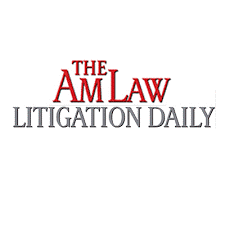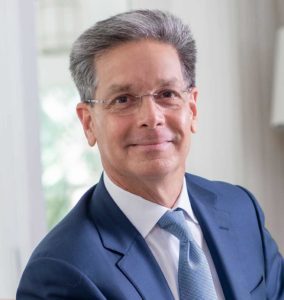

March 10, 2022 at 07:30 AM, Ross Todd, Editor/columnist
For the past six years, Peter Prieto, the head of commercial and class action litigation Miami boutique Podhurst Orseck, has been involved in putting together an annual conference on multi-district class actions and mass tort litigation at his law school alma mater, the University of Miami School of Law.

On Friday, for the first time in two years, The Miami Law Class Action and Complex Litigation Forum is set to push off in-person on campus. The forum, like a lot of things in the legal world, went virtual last year.
The Lit Daily took the occasion to catch up with Prieto, who headed up the national litigation practice at Holland & Knight prior to joining Podhurst Orseck in 2010. Over the past decade-plus, he’s seen his practice shift from primarily defense-side work to a mix of plaintiff- and defense-side assignments. Prieto, who serves as the plaintiffs’ chair lead counsel overseeing in the In Re: Takata Airbags Product Liability Litigation multidistrict litigation, is scheduled to moderate a panel of MDL judges including Senior U.S.
District Charles Breyer of the Northern District of California, U.S. District Judge R. David Proctor of the Northern District of Alabama, and U.S Senior District Judge Federico Moreno and U.S. District Judge Robin Rosenberg, both of Prieto’s home court, the Southern District of Florida. The following has been edited for length and clarity.
So how do you describe what you do and who you do it for?
I do what I’ve always wanted to do, which is high-end sophisticated litigation, primarily for plaintiffs. But I have developed a little bit of a niche in defending law firms and accounting firms, which are usually defendants. I don’t do as much white-collar as I once did, nor do I want to. But right now my practice is like 70% plaintiffs commercial [litigation] 30% law firm/accounting firm defense.
How has your practice been affected over the past two years? I gather that a lot of the plaintiff-side contingency work in your practice mix has been on hold with the lack of available trial dates.
For a lot of plaintiffs firms, no matter what their size, I think what’s been on hold is the resolution of cases, whether by trial or by settlement. The cases can be worked up. What we’ve learned is that depositions can be taken, discovery can be exchanged, hearings can be held. What you don’t have is a deadline. And both lawyers and clients operate on deadlines which are set by a trial. So if a trial is set, and that trial holds, it’s going to get settled or there is going to be a resolution. I think that’s been the biggest difference when it comes to the pandemic.
For plaintiffs firms, there have been very few resolutions of cases because if you’re a defendant, why should you pay X amount of money if there’s no trial coming up? Why not hold on, hold that money, and just wait and see what happens with the pandemic? So that’s been really the biggest impact for plaintiffs firms, who, as you know, work mostly on contingency. So they don’t get paid until the case is resolved one way or the other. The other side of the coin is defense firms get paid as they go along. So, for them, I think the impact of the pandemic has not been as significant as it has been for plaintiffs’ firms.
Well, have the significant trims in costs with lack of flying around the country for hearings in some ways made up for that pinch of not having an inflow from the contingency work?
That offsets some of [expenses in] the whole financial picture. But it doesn’t offset the fact that if there is no resolution, by trial or settlement, there are no revenues coming in, right?
The Miami Law Class Action and Complex Litigation Forum is back in person for the first time in two years. You are going to be moderating a panel of judges speaking on MDL issues. Have you had a chance to ask this esteemed panel of folks from all over the country what might stick from the docket management practices we’ve seen over the past two years? And what might go back to a more pre-pandemic sense of normal?
That’s actually a good question. And I have my own list of questions. That’s not one of them. I may ask them whether the experience of the pandemic has really changed the universe of MDLs. I think the answer I would probably get is, essentially, Zoom. I think across the country, judges are basically saying, especially for the minor, less significant hearings, Zoom is the way to go. And even for significant hearings, some judges are going to stick with Zoom and video conferencing.
Well, you’ve piqued my curiosity. What are you going to ask them about?
I think some of the questions I think they’ll discuss are the ongoing efforts to structure leadership in MDLs in a manner that ensures a diverse leadership group. That’s one. The second topic that will likely be discussed is whether new rules are needed for MDLs. There’s been debate among the defense bar, the plaintiffs bar and the judiciary, about whether specific rules for MDLs are needed. And of course, like everything else in life, it just depends who you ask. There are some judges who believe that we have enough rules, and that the Rules of Civil Procedure provide them with enough flexibility to fashion and receive MDLs efficiently and effectively. The plaintiffs’ bar, I believe, doesn’t want more rules.
There’s been a lot of sophistication in terms of how MDLs are managed. I’m not personally involved in this, but in some MDLs they’re using computer technology to determine which cases should be tried first. In the old days, it was like: “Plaintiffs, you pick two. Defense, you pick two.” Or sometimes you would give the judge a number of cases and the judge would choose which cases would go to trial. So I think the MDL judges are becoming a lot more sophisticated and innovative in trying to manage what can sometimes be just a significantly large case with many, many plaintiffs and many, many parties.
Are there areas that you have your eye on at the moment?
I think one of the areas that has been prominent recently is antitrust cases. You’re seeing a lot more antitrust cases. I think that’s an area where you’re gonna see not simply enforcement action, but also an increase in class actions.
In the 2010s, you saw a lot of class actions against financial institutions. Our firm was involved in the checking account overdraft MDL. That went on for several years. And then over the last probably 10 years, you’ve seen a lot of automotive defect class actions. That’s also been another wave of class actions. The question is what’s the next trend? And right now, as I sit here today, the only one that I can think of — simply because we have a new administration in Washington that seems to be very aggressive about enforcing the antitrust laws — I think antitrust is a type of class action or trend to watch.
Well, going back to the forum, what do you hope to get out of having it back in person for the first time in two years?
I think the biggest benefit we get in person is the interaction among the bar, and between the bar and the judiciary. It’s always good to be able to talk to judges in an informal setting and a social setting, about issues. And that back and forth really benefits both the judges and the lawyers. So that to me is really the biggest benefit of having a back in person.